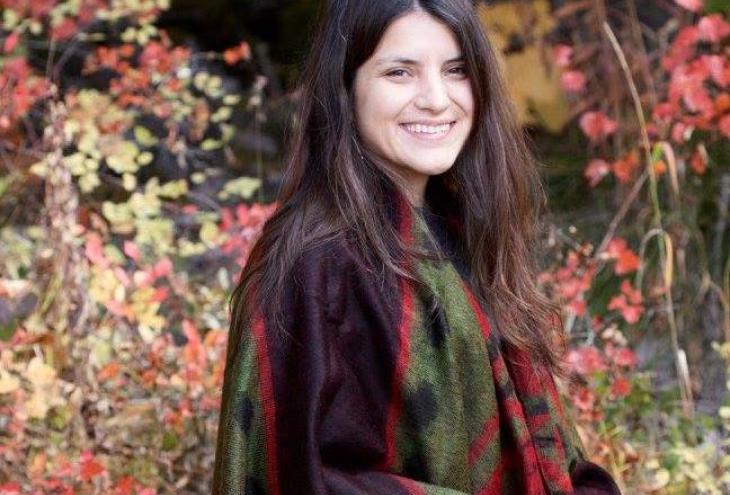It’s not surprising that Hannah Funke has more than a passing interest in fire. She grew up in northwest Montana, where there is a prevalent fire season. When she was young, she and her father would chase wildfires, observing the crews managing them. Both her parents fought fires — her mom’s desire to become a smokejumper was interrupted when she got pregnant with Hannah. Her father went on to become a welder and her mother went back to school to become a paralegal and later a nurse. Neither continued their fire fighting as Funke grew older.
Still, Funke’s interest in fire grew. She focused her education on understanding fire ecology. “I am interested in restoring fire to the land, not necessarily preventing them from happening,” she says. Today she’s working on a PhD in fire ecology, but her path has been both challenging and unconventional.
Her parents divorced when she was young, leaving Hannah to straddle two worlds: one with her father, who stayed on the tribe’s Flathead Indian Reservation, and the other with her mother, who moved off the reservation in Missoula. She attended school in both places, never quite fitting in. “I felt that I didn’t fully belong to my Native side because I was just a first-generation descendant,” she says. “I also didn’t feel fully comfortable in the ‘white’ world.”
She was bullied through school and had a hard time finding her place. “I was fortunate to have strong support to be who I wanted to be from my family and a few of my teachers,” she says. In her senior year, she was expelled for missing classes after her cousin was killed in Iraq. A guidance counselor helped her get into an alternative school, where she earned her first 4.0 GPA and graduated three weeks early, all while working full time. “I had potential, but how modern education is structured, I struggled my way through.”
Funke knew college would be expensive, so after high school she trained to become a massage therapist to support herself through school. “I was a massage therapist for 12 years — and even owned my own practice. I really enjoyed it, but sadly I had to give it up when I became sick with Lyme disease,” she says. Funke had to put her schooling on hold as well for a period of time when she became too sick. Her freshman year at the University of Montana did not go smoothly. In describing how her learning style can be at odds with traditional education, she says, “I don’t just see a tree — where it chooses to grow, what animals rely on it, and how much sunlight it likes — I see the full picture of what makes that tree exist.”
When she transferred to Salish Kootenai College to be able to care for her ill grandmother, she found the school offered much more context. Her advisors helped her pursue her goals, and she applied for and was awarded a competitive internship to travel and study in New Zealand. She also had the opportunity to assist her professor in Alaska teaching about biomass data. “I got more out of my classes at Salish Kootenai College because my instructors used real-life examples to apply what we were learning and took the time to know me as a person,” Funke says.
Upon returning to finish her degree after her fight with Lyme disease, her advisor told her about the Louis Stokes Alliances for Minority Participation (LSAMP) Bridge to Doctorate (B2D) program. She became part of the first cohort of LSAMP-B2D scholars to attend the University of Idaho.
Starting a PhD program during the pandemic came with its own challenges — impersonal, noninteractive Zoom classes were not conducive to Funke’s style of learning. Finding a thesis subject was another source of stress, but when her advisor told her that is was OK that she had multiple ideas and didn't have to focus on one thing, everything clicked. “I have broad-reaching ideas,” she says. “And it turns out that’s OK.”
She is continuing to incorporate Indigenous knowledge in her work to bridge the gap between Western science and traditional ecological knowledge (TEK). “I’m still trying to find comfort in my identity, but I think it’s a strength that I know both worlds,” she says. “Fire is a natural occurrence that has been part of Indigenous culture for thousands of years — fire, disturbance, regeneration. I want to change the public’s perception and let people know that not all fire is bad.”
After getting her PhD, Funke hopes to continue to learn and spread TEK. She is looking to create a teaching tool similar to the Banbai Rangers fire calendar as part of her current research. “I am using it as a guide to create my own outreach tool to show the positive and negative effects that fire can have in relation to seasonality,” she says. She wants to be able to communicate her research to those in and out of the scientific world. Funke is also looking at the fire effects of culturally important plants native to her home. Still weighing her options once she obtains her degree, Funke notes that you never know where life will take you. “It’s been a wild ride to get to a PhD program, but I wouldn’t have it any other way,” she says. “I have gained a lot of knowledge over the years and want to be able to share that with my community, and hopefully make a difference in the world.”













